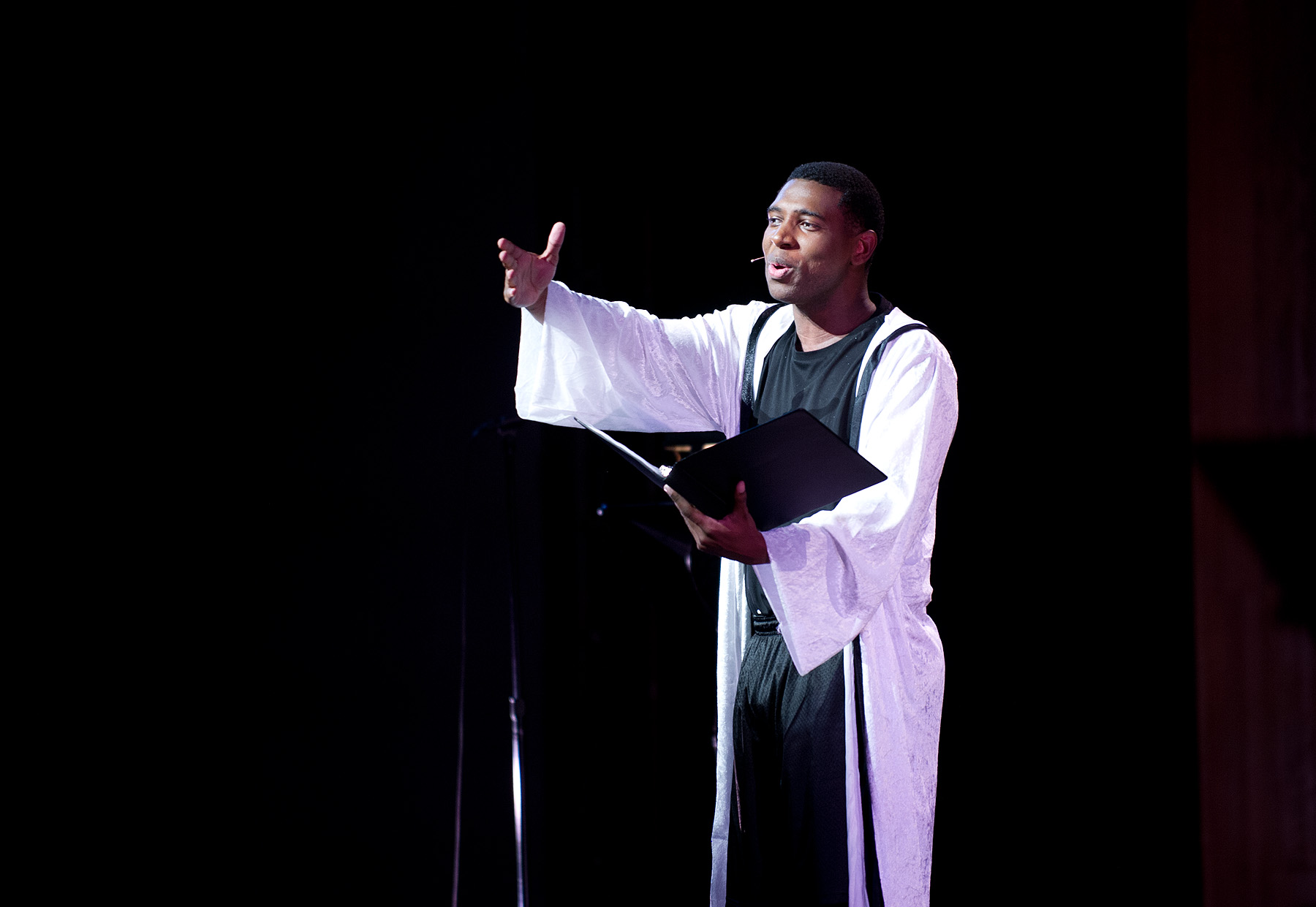The Abduction from the Seraglio
By Wolfgang Amadeus Mozart
Directed by David Gately
Joseph Mechavich, Conductor
Review by Annette Skaggs
Entire contents copyright © 2016 Annette Skaggs. All rights reserved.
Gustav Andreassen in The Abduction from the Seraglio. Photo by Bill Brymer
It has been several years since the Kentucky Opera has performed Die Entführung aus dem Serail; thirty years to be exact. Why so long? While not in rotation as often as others, such as Le Nozze di Figaro or Die Zauberflöte, it is an important piece in the life and legacy of the genius composer. Under the employ of Emporer Joseph II, Mozart desired to write a German opera that would rival any Italian opera. The Emporer agreed and thus Mozart’s Abduction from the Seraglio was born. Set as a Singspiel (a form of German light opera, typically with spoken dialogue) this particular piece was (and is) considered a masterpiece and was Mozart’s most beloved work during his lifetime, having reached 18th century International renown. It is in reference to this opera that Emperor Joseph commented to young Mozart, “Too beautiful for our ears, my dear Mozart, and monstrous many notes!” Assumingly, with a strong conviction, Mozart replied, “Exactly as many as is necessary, Sire!”
Yes indeed, it is a splendid opera, but believe it or not, there are times that I side with Emperor Joseph about too many notes. If you are at all familiar with the piece, you know that it is riddled with run, after run, after run. Don’t get me wrong, they are a great vehicle for singing, but they can get taxing after a while and it takes a strong vocalist to hold your interest. Lucky for the Kentucky Opera they had some great artists that did just that…for the most part.
The plot of the story is set during the Ottoman Empire (and not PC by our 21st Century standards) when a ship is pirated and all aboard are sold to the Pasha Selim for his pleasure. Noblewoman Constanze (Devon Guthrie) and her lady-in-waiting Blonde (Ashly Neumann) are sent to the Seraglio while Blonde’s fiancé Pedrillo becomes the Pasha’s gardener. Soon, we meet Nobleman Belmonte (Joshua Dennis), who sailed to Pasha’s seaside palace in search of his beloved Constanze. Upon his arrival, Belmonte and Pedrillo devise a plan to abduct their loves from the Seraglio. Easier said than done when the Seraglio is protected by the Pasha’s overseer, Osmin (Gustav Andreassen). The Pasha finds himself in love with Constanze, but she does not return that favor, as her heart belongs with Belmonte and is willing to withstand torture, even death, to prove her love. Through clever trickery and deceit, the lovers are united and on their way to freedom when Osmin catches them. While pleading their case to the Pasha the couples are able to convince him of their true love for one another and he allows the lovers their freedom.
There are many gags that are set forth within the piece that under Director David Gately’s eye seemed to harken to vaudevillian days of the early 20th Century. Many of them were obvious while others were subtle and, to me, made the comedy even brighter.
The scenery was something straight out of a painting: a wall with an open window framed by a gilded frame, on a platform, that provided the indoors and outdoors of the palace, complete with finely trimmed trees and hidden doorways. My question to the set designer, why was a chair used for the principles to get up and down from the platform? There were a few times where it looked like the chair slipped a bit and the principle was lucky enough to catch themselves while stepping off of it. While the chair provided great set placement for a few scenes, it didn’t look in place most of the time. Costumes were elegant and colorful and added even more beauty to the stage.
Whit Whitaker’s Pasha was enjoyable, even though his accent wasn’t consistent. Joshua Dennis‘ Belmonte was delightful and full of hope and promise. Devon Guthrie’s Constanze was played as I always suspected Mozart’s wife, Constanze Weber, to be in real life: devoted and true. Her open and captivating soprano approached the difficult runs with expertise and verve, but didn’t hold my attention as I would have liked.
It is no secret that I have enjoyed listening to Gustav Andreassen’s turns on the Brown Theatre stage and his Osmin is no exception. With a bass score that plunges into the farthest reaches of a bass voice, he often hit that sweet spot with the Louisville Orchestra where his ability to project such a low note was in balance with the musicians. Thank you to Conductor Joseph Mechavich, who has the ability to detect when the reigns may need to be pulled back a little bit. Mr. Andreassen is certainly a rising star within the opera community.
I am happy to say that Studio Artists Ryan Connelly and Ashly Newmann were absolutely radiant as Pedrillo and Blonde. Each possessed great comic timing and chemistry on stage. While the singing could have been a little stronger, it was very well executed. Brilliant job!
While there isn’t much for the multi-talented Kentucky Opera Chorus until the Turkish Finale, the soloists in the first act introduction of Pasha Selim seemed to lack vitality, excitement and were difficult to hear.
While there are some ideologies and beliefs that are a bit taboo in today’s world in The Abduction from the Seraglio, I believe that the Kentucky Opera handled them all with fantasy, fun, frivolity and great singing.
Bravi, Tutti!
The Abduction from the Seraglio
November 4 & 6, 2016
Kentucky Opera
W.L. Lyons Brown Theatre
315 West Broadway
Louisville, KY 40202
(502) 562-0188
www.kentuckycenter.org
Annette Skaggs is heavily involved as an Arts Advocate here in Louisville. She is a freelance professional opera singer who has performed throughout Europe and in St. Louis, Cincinnati, Boulder, Little Rock, Peoria, Chicago, New York and of course Louisville. Aside from her singing career, she has been a production assistant for Kentucky Opera, New York City Opera, and Northwestern University. Her knowledge and expertise have developed over the course of 25+ years’ experience in the classical arts.





